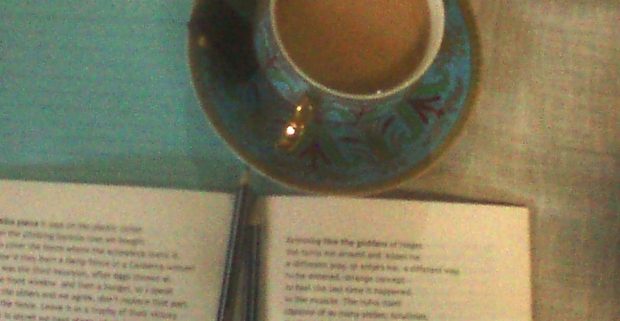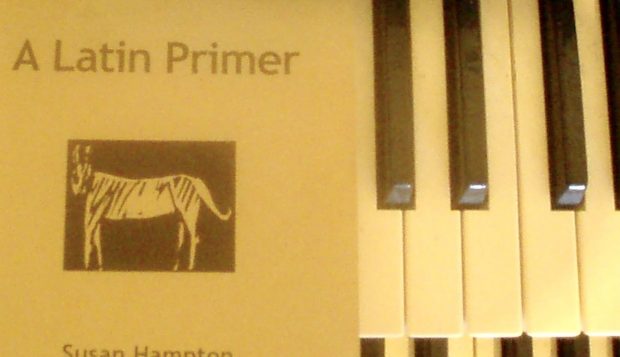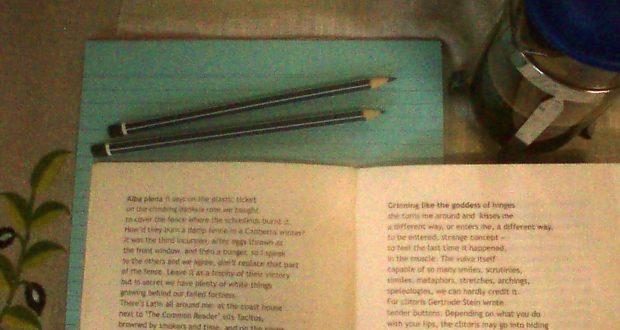Reading Secondhand: Susan Hampton at Sappho Books
by Ali Jane Smith
The walk from Sydney’s Central Station along Broadway to Glebe Point Road did not have a lilting, iambic rhythm. It was a prog rock experience, a march through a tunnel, a stroll along the footpath, a scurry across a road that inexplicably lacked a pedestrian crossing, more footpath, more scrambling with or against the lights until the corner is turned, and Glebe Point Road achieved.
Here, the traffic ambled, no-one was trying to make time. Here, there were cafes and restaurants, the famous Gleebooks, site of many deeply pleasurable browsing hours, and Sappho Books, a secondhand bookshop with a Cafe and Wine Bar out the back. The cafe is home to a long running series of poetry readings, currently Avant Gaga, expertly put together by Toby Fitch. Before Toby’s time, Roberta Lowing handled the conjuring trick of booking guest poets, setting up the PA, managing the Open Mic and, eventually, sending everyone home.
When I worked in Sydney I sometimes went to the readings at Sappho Books. I remember especially readings by Jill Jones, Nicolette Stasko, and Joanne Burns. The best times, I was there with poet friends, Linda Godfrey, Dael Allison, Carol Jenkins, Julie Chevalier. Often I came alone, and because I came straight from work, I was always awkwardly early. Never mind, time to browse in the bookshop. In fiction, I’d look under ‘B’ for Beryl Bainbridge and both ‘M’ and ‘J’ for Adam Mars Jones, maybe find a crime novel for the train home, then go to the poetry section. The poetry section of a good secondhand bookshop requires an especially intensive type of browsing, because there are so many chapbooks and books from small presses with stapled, rather than perfect bound, spines, sometimes printed in non-standard formats. Identifying these books means looking at their covers, and I must have been looking carefully one night, because I found a slim, squarish, stapled book, A Latin Primer, by Susan Hampton.
Somewhere along the line, maybe even in high school, I had encountered Susan Hampton’s Surly Girls. It made new pictures in my mind, vague shapes. As an undergraduate at university, we worked from The Penguin Book of Australian Women Poets edited by Susan Hampton and Kate Llewellyn. I read the poems set for the English course I was taking with Dr. Dorothy Jones – she discussed Judith Beveridge’s ‘The Domesticity of Giraffes’ in a lecture, and whenever I see a giraffe’s prehensile tongue (something that has happened more often than one might expect), I think of that day. I remember also Dr Jones pointing out the way the phrase ‘Max Factored’ evoked not only the brand of cosmetic but also the word ‘manufactured’. Something went ping in my head. I kept reading that book, and the cover became familiar, friendly.
Susan Hampton was one of the poet-teachers at the first Five Islands Press Poetry Workshop I attended. She led a workshop group that I was in, gave a lecture, and a wonderful extended reading from her then-latest book, The Kindly Ones. All the readings given by poets at that workshop were wonderful. Michael Sharkey and Kevin Brophy showed me that poetry could be funny, so funny, and if it was angry and sad, that made it funnier, but the funniness made it angrier and sadder, too. Ron Pretty performed the superhuman feat of organising the whole event, as well as taking on the role of poet-teacher for the week. I remember his reading, poems full of ordinary things carrying great emotional intensity, especially in that setting, a roomful of poetry-loving people who were by then tired and familiar and drunk – on wine or language – enough to be able to hold those emotions collectively, like an enormous wobbly jellyfish.
Most readers stood at the front of the room, sometimes at a lectern. Susan sat on a high stool, a bit off to the side, holding The Kindly Ones open in her hand. The cover was a deep bottle green. The Kindly Ones is an epyllium, a mini-epic, about The Furies returning to earth to live as human women for a while. She read quietly, at a measured pace, and held the room. So I knew A Latin Primer would be a prize.
Susan Hampton pays attention to form, to structure, to rhythm and language and makes as good a use of the devices available to the poet as anybody. Beyond this, she has the ability to make every line sound, even when enjambed, perfectly conversational. Her poems are written in vernacular Australian speech, an educated Australian vernacular, but not posh, even when her subject is, ostensibly, Latin, a language associated with exclusive and privileged knowledge. In my notes for this piece I had written that her poems were made with invisible stitches, but then I turned a page and saw that I had pinched this metaphor from her. It appears in the poem ‘The musculature for the desire’.
The poems in A Latin Primer do not have separate titles, instead, the first few words of each poem are printed in bold. After several re-readings, I see how those opening words are the seed or bomb-casing from which the whole poem expands. When I get stuck trying to follow what is going on in the poem, I can glance back at those opening words, and set out once again. Her poetry has a persistent waywardness. It never rests, never settles. Even while Hampton carefully sets out her most elegant, carefully thought through apparent certainties, you see something, some other thought, contradictory, unsettling. A new possibility or a piece of mischief makes its peripheral presence felt. Always ‘but’, always ‘perhaps’, always a sceptic’s ‘hmm’. The poems are about how to live, though not so much the philosopher’s question of ‘how to live well’, more ‘how to keep going’, the everyday survival of body and perhaps soul, certainly body and mind.
There’s a line in A Latin Primer, that starts, “How’d they burn a damp fence”, and I say those words over and over. I make it six syllables to be read as two slow anapaests. The end of the line reads ‘in a Canberra winter’. If I say that out loud in my countrified Australian accent I get three near rhymes: in a/Can’bra/win-ta. Ta da! It was Susan Hampton who first prompted me to pay attention to such things. Who pointed out that I needed to read more, needed to find out more about how to make a poem. When I read A Latin Primer, on the train home to Wollongong after a poetry reading, I saw the use to which such reading and learning might be put.
Photo credits: Ali Jane Smith


